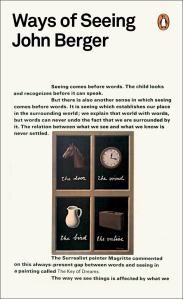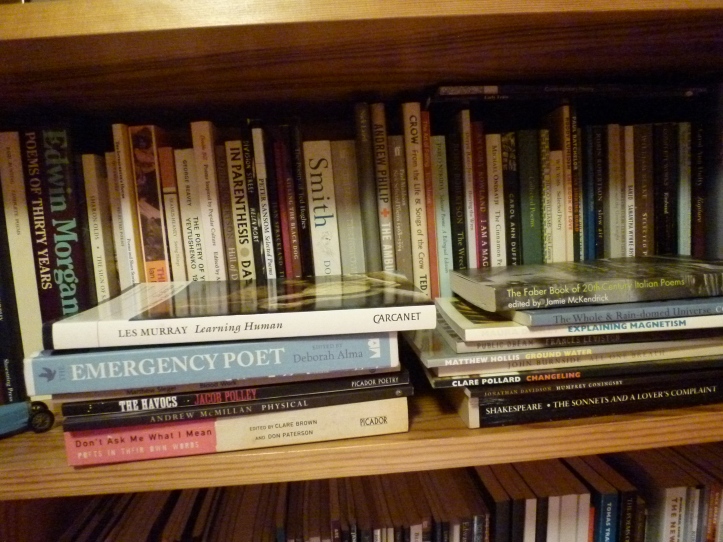When I was about thirteen, my sister went to university to study English and psychology. When she came home she brought lots and lots of books, one of these being John Berger’ s ‘Ways of Seeing’.
I’d never seen anything like it before. It contained a series of essays in words and images and I was fascinated by the presentation of ideas which were accessible and new to me. I don’t have a copy of the book now so I’ve looked it up on the internet, and I’m not surprised to find that the ideas explored in the essays, published in 1972, are still of interest to me; that through reproduction, an Old Master‘s painting is severed from the context in which it was made; that the female nude is often not depicted as ‘herself’ but rather as a subject of male idealisation or desire; that the use of oil paint and symbols reflect the status of the individuals who commissioned the work of art. Berger also looked at advertising, and argued that colour photographs had taken over the role of oil paint, though the context had been reversed. This meant an idealised potential for the viewer, a substitution for the reality depicted in old master portraits.
I mentioned all this because whilst sorting my overloaded bookshelves ( a regular activity)
I found a copy of Berger’s ‘and our faces, my heart, brief as photos’ a book I didn’t realise I had and one I must have picked up secondhand at some point.
I opened the book at the page with the title ‘once in a poem’ and what I read seemed to relate to something I’d been musing on, namely the difference between poems and short stories. I’d been thinking about this since I’d recently received a proof of my short story ‘Late’ , which is soon to be published in Bare Fiction magazine. I wrote it as I often write poems, the bones being laid down in one sitting and the work being revisited and revised in subsequent drafts. Here is what Berger has to say on the difference between poems and stories.
‘ Poems, even when narrative, do not resemble stories. All stories are about battles, of one kind or another, which end in victory or defeat. Everything moves towards an end, when the outcome will be known’.
I’m not sure I agree with this, having just read a short story which seems to end neither in victory nor defeat but leaves the reader suspended although now I think about it, perhaps that in itself was an outcome. Berger continues, and I do like this bit
‘ Poems, regardless of any outcome, cross battlefields, tending the wounded, listening to the wild monologues of the triumphant or the fearful. They bring a kind of peace. Not by anesthesia or easy reassurance, but by recognition and the promise that language is acknowledged, has given shelter, to the experience which demanded, which cried out.’
It is sometimes seems ridiculously difficult to pin down what poems do. But I’m sure they do this. And more.


Love the idea of a poem crossing a battle field. May I quote on my Facebook page?
LikeLike
Thanks Jean. Please feel free- I’m quoting from Mr Berger. Have a look at the ‘Poets on Poetry’ page of this site if you have time- I’ve collected quite a quotes you might find interesting. All the best, Roy
LikeLike
You’ve made me want to see if the Beeb do the series on DVD (as they do with ‘The ascent of man’ and ‘Civilisation’). ‘Ways of seeing’, and ‘The Country and the City’ by Raymond Williams are the two books that shaped the way I see the world.
LikeLike
Cheers John. Someone told me the book was horribly dated in places. Aren’t we all.
LikeLike
Meaningless and pejorative in equal measure. Dated. So is Dickens. Eliot. Hardy. Yeats. Is it radical? Well, now it sounds like common sense. So does the notion of gravity, and a heliocentric universe. Marxist cultural theory is going to be ‘dated’….of course it is. Sometimes though it’s a lazy way of saying something is wrong. As in ‘horribly dated’. No it isn’t.
LikeLike
Ok. I’ll tell the bloke who said it!
LikeLike
Leave him to find it on your blog,Roy. We know we’re on the side of the angels. Whether the converse is true remains to be seen
LikeLike